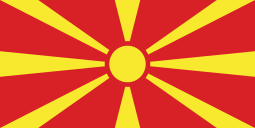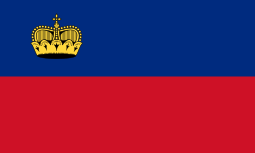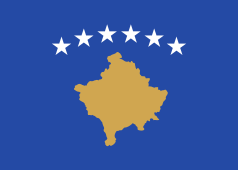European Union Prize for Literature
European Union Prize for Literature (established in 2009) is a European Union literary award. The award is funded and founded by the Culture Programme of the European Union, and is coordinated by a Consortium, selected by a Commission.[1] The Consortium is composed of the European Booksellers Federation, the European Writers' Council and the Federation of European Publishers.[1] The Consortium sets up the national juries and organizes the awards.
| European Union Prize for Literature | |
|---|---|
| Country | |
| Presented by | EUPL Consortium: European and International Booksellers Federation (EIBF), European Writers' Council (EWC), Federation of European Publishers (FEP) |
| First awarded | 2009 |
| Website | www.euprizeliterature.eu |
Each year 11 or 12 countries are selected to be part of the award, national juries are selected for each country, and each country's jury then selects a winner.[1] After three years of rotation, all countries will have been included. Countries eligible for inclusion include:[1]
- The 28 Member States of the European Union (as of 2013)
- The 3 EEA countries: Norway, Iceland and Liechtenstein
- The candidate countries for accession to the EU: Albania, Turkey, Montenegro, the Republic of Macedonia, Serbia
- Potential candidate country for accession to the EU: Bosnia and Herzegovina
Each winner receives €5,000 and their books are given support for translation funding, as well as promotion.[1]
Winners
2009
Winners for 2009 were announced November 2009.[1]












2010
Winners for 2010 were announced 18 November 2010.[1][2]
.svg.png)










2011
Winners for 2011 were announced 11 October 2011.[3][4]












2012
The awards ceremony was in Brussels on 22 October 2012.[5]












2013
The winners were announced on 26 September 2013. The ceremony was in Brussels on 26 November 2013.[6][7]
.svg.png)











2014
The winners were announced on 8 October 2014 at the Frankfurt Book Fair.[8]













2015
The winners were announced in April 2015, at the opening ceremony of the London Book Fair by Tibor Navracsics, European Commissioner for Education, Culture, Youth and Sport.[9]












2016
The winners were announced in April 2016 at the European Commission.[10]
.svg.png)











2017
The winners were announced 21 April 2017.[11]












2019
The winners were announced 24 May 2019.[25]














2020
The winners were announced 19 May 2020.[26]
.svg.png)












Translations
The European Union promotes the transnational circulation of literature and its diversity in Europe and beyond.[27] The list below shows some translations available in English language:






























.svg.png)





References
- European Union Prize for Literature, official website
- "Winners of 2010 EU Prize for Literature honoured at award ceremony." European Union News 22 Nov. 2010. Infotrac Newsstand. Retrieved 11 Oct. 2012.
- "Winners of the 2011 European Union Prize for Literature". Euprizeliterature.eu. 11 October 2011. Archived from the original on 1 March 2014. Retrieved 23 July 2013.
- "Winners of the 2011 European Union Prize for literature." European Union News 11 Oct. 2011. General OneFile. Retrieved 11 Oct. 2012.
- "EU Prize for Literature picks 12-to-read". Euronews. 9 October 2012. Archived from the original on 14 October 2012. Retrieved 10 October 2012.
- Elana Ralli (26 September 2013). "Announcing the winners of the 2013 European Union Prize for Literature". New Europe. Archived from the original on 28 March 2016. Retrieved 27 September 2013.
- Staff writer (26 September 2013). "Winners of 2013 European Union Prize for Literature announced at Göteborg Book Fair". EU Reporter Magazine. Retrieved 27 September 2013.
- European Commission. "Winners of 2014 European Union Prize for Literature announced at Frankfurt Book Fair - Press Release". Retrieved 11 October 2014.
- "European Union Prize for Literature 2015 winners announced at London Book Fair". European Commission. April 2015. Retrieved 20 April 2015.
- "2016 EU Prize for Literature winners announced". ec.europa.eu. Retrieved 25 March 2017.
- "Announcement of winners of the 2017 European Union Prize for Literature". ec.europa.eu. 21 April 2017. Archived from the original on 23 April 2017. Retrieved 22 April 2017.
- "Winning Authors 2017: Rudi Erebara". ec.europa.eu. 21 April 2017. Archived from the original on 23 April 2017. Retrieved 22 April 2017.
- "Winning Authors 2017: Ina Vultchanova". ec.europa.eu. 21 April 2017. Archived from the original on 23 April 2017. Retrieved 22 April 2017.
- "Winning Authors 2017: Bianca Bellová". ec.europa.eu. 21 April 2017. Archived from the original on 23 April 2017. Retrieved 22 April 2017.
- "Winning Authors 2017: Kallia Papadaki". ec.europa.eu. 21 April 2017. Archived from the original on 23 April 2017. Retrieved 22 April 2017.
- "Winning Authors 2017: Halldóra K. Thoroddsen". ec.europa.eu. 21 April 2017. Archived from the original on 23 April 2017. Retrieved 22 April 2017.
- "Winning Authors 2017: Osvalds Zebris". ec.europa.eu. 21 April 2017. Archived from the original on 23 April 2017. Retrieved 22 April 2017.
- "Writer wins EU Prize for Literature". eng.lsm.lv. 21 April 2016. Retrieved 25 April 2017.
- "Winning Authors 2017: Walid Nabhan". ec.europa.eu. 21 April 2017. Archived from the original on 23 April 2017. Retrieved 22 April 2017.
- "Winning Authors 2017: Aleksandar Bečanović". ec.europa.eu. 21 April 2017. Archived from the original on 23 April 2017. Retrieved 22 April 2017.
- "Winning Authors 2017: Jamal Ouariachi". ec.europa.eu. 21 April 2017. Archived from the original on 23 April 2017. Retrieved 22 April 2017.
- "Winning Authors 2017: Darko Tuševljaković". ec.europa.eu. 21 April 2017. Archived from the original on 23 April 2017. Retrieved 22 April 2017.
- "Winning Authors 2017: Sine Ergün". ec.europa.eu. 21 April 2017. Archived from the original on 23 April 2017. Retrieved 22 April 2017.
- "Winning Authors 2017: Sunjeev Sahota". ec.europa.eu. 21 April 2017. Archived from the original on 23 April 2017. Retrieved 22 April 2017.
- "Winners of the 2019 EU Prize for Literature announced". PenNews. Retrieved 27 May 2019.
- "European Union Prize For Literature announces 2020 laureates". Retrieved 19 May 2020.
- "Creative Europe | EU Prize for Literature". www.euprizeliterature.eu.
External links
- European Union Prize for Literature official website